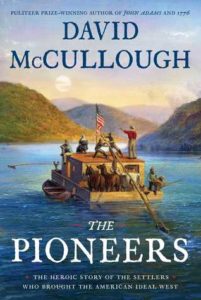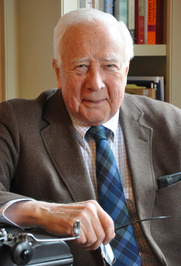 I recently finished reading a book that I enjoyed very much, so I thought I would share it with you. It is David McCullough‘s latest book titled: “The Pioneers: The Heroic Story of the Settlers Who Brought the American Ideal West.” It is a rather long title and a little misleading. When I think of pioneers who brought the American Ideal west, I think of pioneers in the West. But this book is about pioneers in Ohio, specifically in Marietta.
I recently finished reading a book that I enjoyed very much, so I thought I would share it with you. It is David McCullough‘s latest book titled: “The Pioneers: The Heroic Story of the Settlers Who Brought the American Ideal West.” It is a rather long title and a little misleading. When I think of pioneers who brought the American Ideal west, I think of pioneers in the West. But this book is about pioneers in Ohio, specifically in Marietta.
“The Pioneers: The Heroic Story of the Settlers Who Brought the American Ideal West” is about the founding of Marietta. Although I grew up in Ohio and knew a little of the history, David McCullough really fleshes it out. Of course David McCullough is known for his intricately researched and detailed books. We recently had a visitor at Fort Necessity who met David McCullough in Marietta when he was there researching the book. This book has all the details you might want about the sturdy and colorful people who hacked a new city on the hill out of the wilderness.
I learned about Ephraim Cutler and his father Manasseh. He was one of the first settlers, a congressman in Ohio for many years, and founder of Ohio University and Marietta College. I read about Rufus Putnam, a General in the Revolutionary War who led the first settlers to Marietta. The first people who settled in Marietta were from New England, and they were determined to make Marietta a place of culture and learning.

David McCullough also writes extensively about other founders of the town, such as the first architect and the first doctor. Through it all flows the Ohio River with its own important part in the story – almost as if it is a character of its own. I knew the least about the chapter on Harman and Margaret Blennerhassett who built a grand showcase of an home on an island in the river. Harman was indicted in the treasonous Aaron Burr conspiracy and had to flee back to England.
McCullough fills out each person in “The Pioneers” and takes you from the beginning of Marietta up until the start of the Civil War. I was only disappointed that the book ignored the Native Americans living in the area. Aside from a few mentions of battles, that focus mostly on the American point of view, the book doesn’t mention the Native Americans. The book is shorter than many of McCullough’s books and should be interesting to anyone who wants to learn more about the founding of Ohio.
